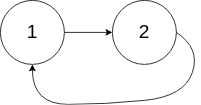2.8 KiB
-
Leetcode Linked-List-Cycle-II
2022-09-08 15:56
Algorithms:
#algorithm #Floyd_s_cycle_finding_algorithm
Data structures:
#DS #linked_list
Difficulty:
#coding_problems #difficulty_medium
Additional tags:
#leetcode
Revisions:
N/A
Links:
Problem
Given the head of a linked list, return the node where the cycle begins. If there is no cycle, return null.
There is a cycle in a linked list if there is some node in the list that can be reached again by continuously following the next pointer. Internally, pos is used to denote the index of the node that tail's next pointer is connected to (0-indexed). It is -1 if there is no cycle. Note that pos is not passed as a parameter.
Do not modify the linked list.
Examples
Example 1:
Input: head = [3,2,0,-4], pos = 1 Output: tail connects to node index 1 Explanation: There is a cycle in the linked list, where tail connects to the second node.
Example 2:
Input: head = [1,2], pos = 0 Output: tail connects to node index 0 Explanation: There is a cycle in the linked list, where tail connects to the first node.
Example 3:
Input: head = [1], pos = -1 Output: no cycle Explanation: There is no cycle in the linked list.
Constraints
- The number of the nodes in the list is in the range
[0, 104]. -105 <= Node.val <= 105posis-1or a valid index in the linked-list.
Thoughts
[!summary] This is a #Floyd_s_cycle_finding_algorithm phase 2 problem.
Already explained in Floyd's Cycle Finding Algorithm
A follow-up to Leetcode Linked-List-Cycle
One thing to remember is that in the beginning, fast == slow, which makes the while loop break.
Solution
/**
* Definition for singly-linked list.
* struct ListNode {
* int val;
* ListNode *next;
* ListNode(int x) : val(x), next(NULL) {}
* };
*/
class Solution {
public:
ListNode *detectCycle(ListNode *head) {
// Floyed's circle finding algorithm
ListNode *fast = head;
ListNode *slow = head;
bool hasLoop = false;
while (fast != nullptr && fast->next != nullptr) {
fast = fast->next->next;
slow = slow->next;
if (fast && fast == slow) {
// loop found
hasLoop = true;
break;
}
}
if (hasLoop == false) {
return nullptr;
} else {
slow = head;
while (slow != fast) {
slow = slow->next;
fast = fast->next;
}
return slow;
}
}
};


